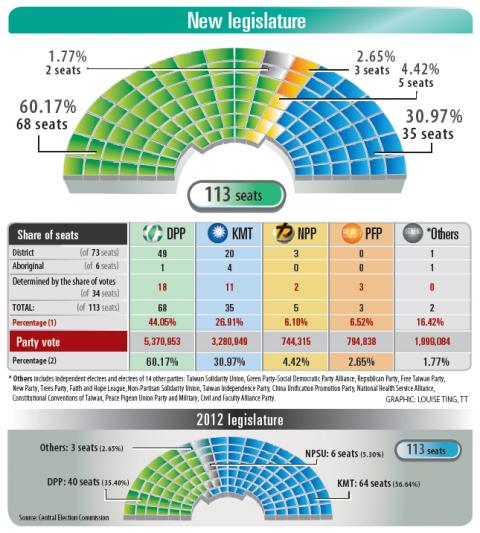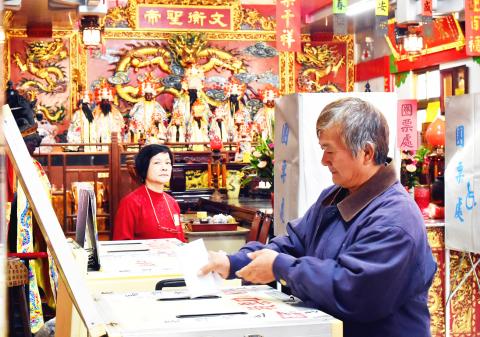The Democratic Progressive Party (DPP) won a legislative majority in yesterday’s election, securing 68 seats in the 113-seat legislature. With its ally the New Power Party (NPP) winning five legislative seats, the DPP is expected to enjoy unrestricted power in the parliament.
Before the elections, the DPP had called on voters to cast their legislative ballots for the party’s candidates to help it secure a majority in the legislature without the NPP’s assistance.
The Chinese Nationalist Party (KMT), which held 64 legislative seats before the election, hoped to secure at least 38 seats to prevent the majority party or alliance to motion for a recall of the president, which can be done with a two-thirds majority in the legislature. The DPP got what it wanted, but not the KMT.

Graphic: Louise Ting, Taipei Times
DPP president-elect Tsai Ing-wen’s (蔡英文) “coattail effect” has helped the party sweep legislative votes.
However, the real force that carried the opposition parties to victory is probably the “awakened youth,” who have been calling for the removal of the KMT from government since 2014’s Sunflower movement.
The NPP, which was established in the movement’s wake, fielded three political novices in the election — a leading activist in the Sunflower movement, a famous metal singer and a victim-turned symbol of nationwide demonstrations against abuse in the military — as its regional legislative candidates. All three got elected, defeating three veteran KMT lawmakers.

Photo: Chang Chung-yi, Taipei Times
However, while the NPP has won representation in the legislature as expected, the 5 percent threshold has proved to be a hurdle for other small parties, such as the Green Party-Social Democratic Party Alliance, the Republican Party and the Faith and Hope League, which are among parties that were established following the Sunflower movement.
The Taiwan Solidarity Union, which had three seats in the 2012 legislature, failed to cross the 5 percent threshold this time. The rise of the NPP was definitely a factor, but its decision to team up with Le Flanc Radical, a Taiwan-independence group consisting of young people, has been considered a move that came too late to garner young votes.
The People First Party’s (PFP) crossing the threshold might be seen as a coattail effect of its party chairman and presidential candidate James Soong (宋楚瑜). It was said that Soong’s bid, which was his third, was a ploy to campaign for party votes. It remains to be seen how the PFP would retain its so-called “non-blue, non-green and middle way” in a pan-green parliament.
The New Party, which received tacit support from Deputy Speaker Hung Hsiu-chu (洪秀柱) of the KMT and other KMT members who were dissatisfied with the party’s at-large legislative candidate list, made gains, winning more than 4 percent of party votes, while having only won 1.49 percent of the votes in 2012.
With the KMT’s rout, the distribution of the political power within the KMT and the pan-blue camp as a whole would be followed closely.
An interesting point raised by commentators is how the forced apology of Korean pop music group member Chou Tzu-yu (周子瑜) affected young voters and the elections’ outcome. It has been said that many young people decided to vote after the incident, in defiance of pressure from China. The DPP’s victory, in terms of its gains in party votes compared with what was expected, is said to be an outcome of the incident.
The KMT had secured 64 seats in a 113-seat legislature in 2012, while the DPP had 40 seats, the Taiwan Solidarity Union and the PFP each had 3, the Non-Partisan Solidarity Union had 2 and independents, 4.

ANOTHER EMERGES: The CWA yesterday said this year’s fourth storm of the typhoon season had formed in the South China Sea, but was not expected to affect Taiwan Tropical Storm Gaemi has intensified slightly as it heads toward Taiwan, where it is expected to affect the country in the coming days, the Central Weather Administration (CWA) said yesterday. As of 8am yesterday, the 120km-radius storm was 800km southeast of Oluanpi (鵝鑾鼻), Taiwan’s southernmost tip, moving at 9kph northwest, the agency said. A sea warning for Gaemi could be issued tonight at the earliest, it said, adding that the storm is projected to be closest to Taiwan on Wednesday or Thursday. Gaemi’s potential effect on Taiwan remains unclear, as that would depend on its direction, radius and intensity, forecasters said. Former Weather Forecast

As COVID-19 cases in Japan have been increasing for 10 consecutive weeks, people should get vaccinated before visiting the nation, the Centers for Disease Control (CDC) said. The centers reported 773 hospitalizations and 124 deaths related to COVID-19 in Taiwan last week. CDC Epidemic Intelligence Center Director Guo Hung-wei (郭宏偉) on Tuesday said the number of weekly COVID-19 cases reported in Japan has been increasing since mid-May and surpassed 55,000 cases from July 8 to July 14. The average number of COVID-19 patients at Japan’s healthcare facilities that week was also 1.39 times that of the week before and KP.3 is the dominant

The Chinese Communist Party’s (CCP) working group for Taiwan-related policies is likely to be upgraded to a committee-level body, a report commissioned by the Mainland Affairs Council (MAC) said. As Chinese President Xi Jinping (習近平) is increasingly likely to upgrade the CCP’s Central Leading Group for Taiwan Affairs, Taiwanese authorities should prepare by researching Xi and the CCP, the report said. At the third plenary session of the 20th Central Committee of the CCP, which ended on Thursday last week, the party set a target of 2029 for the completion of some tasks, meaning that Xi is likely preparing to

US-CHINA TRADE DISPUTE: Despite Beijing’s offer of preferential treatment, the lure of China has dimmed as Taiwanese and international investors move out Japan and the US have become the favored destinations for Taiwanese graduates as China’s attraction has waned over the years, the Ministry of Labor said. According to the ministry’s latest income and employment advisory published this month, 3,215 Taiwanese university graduates from the class of 2020 went to Japan, surpassing for the first time the 2,881 graduates who went to China. A total of 2,300 graduates from the class of 2021 went to the US, compared with the 2,262 who went to China, the document showed. The trend continued for the class of 2023, of whom 1,460 went to Japan, 1,334 went to